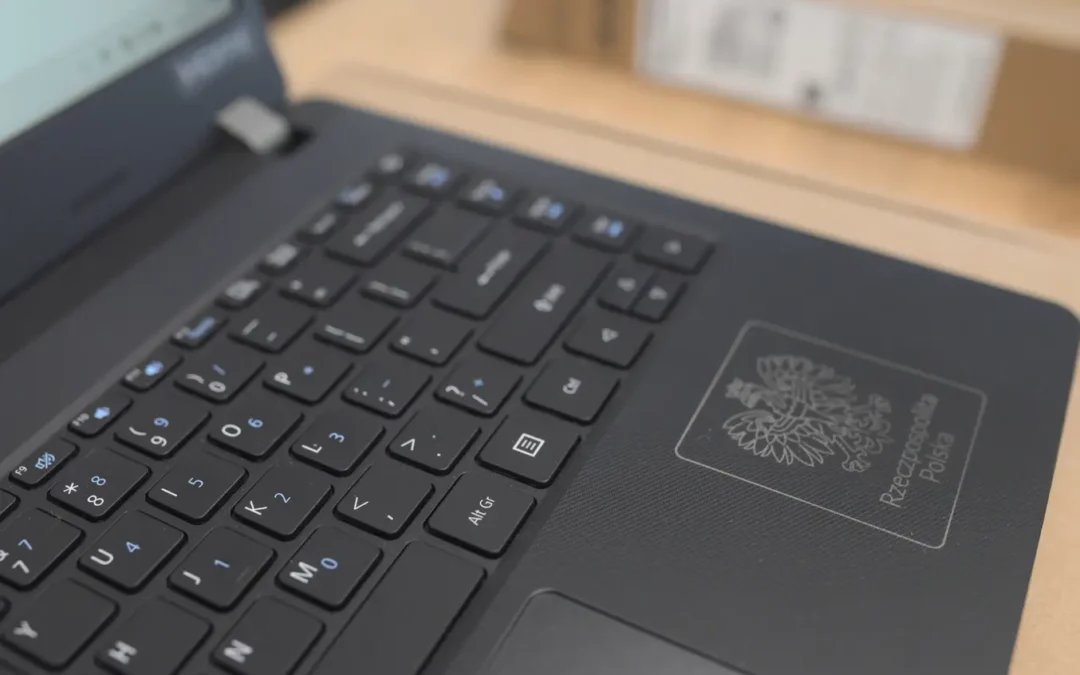Poland’s new government has suspended a programme introduced by the previous administration at the start of this school year to provide free laptops to all students entering fourth grade.
It says the former government failed to provide funding for the scheme – which was introduced just before October’s elections – did not ensure the laptops would be used to support education, and may have allowed corruption to take place in the tender process for buying the equipment.
“Due to the mistakes and negligence of the previous government, we are forced to suspend the ‘Laptop for pupils’ program,” announced Krzysztof Gawkowski, who serves as both digital affairs minister and deputy prime minister. “It was not a digitisation programme, but an election programme.”
#PILNE | Wszystko wskazuje na to, że podczas przetargu na zakup laptopów w ramach programu "Laptop dla ucznia" doszło do naruszenia przepisów karnych, mogło dojść do sytuacji korupcyjnych – poinformował w czwartek minister cyfryzacji Krzysztof Gawkowski.https://t.co/PdPmAzDaeH pic.twitter.com/9nnQOMmbfz
— TVN24 BiS (@TVN24BiS) February 8, 2024
In September, as children returned to school from the holidays, those beginning fourth grade – aged 9 or 10 – were each given a free laptop as part of a scheme introduced by the Law and Justice (PiS) government ahead of parliamentary elections that took place the following month.
Around 400,000 children were eligible in total. They were able to take the laptops home and use them for any purpose without restriction. However, the devices could not be sold or disposed of in any other way for a period of five years.
The programme was meant to be financed through the European Union’s post-pandemic recovery fund.
However, today the new government, which took office in December, says that last year’s funds – amounting to 1.15 billion zloty (€266 million) – were not secured and the 1.3 billion zloty needed this year was not included in the 2024 budget prepared by PiS before it left office.
The government has distributed the first 4,000 of almost 400,000 laptops it is providing to all pupils in fourth grade. Teachers will also receive vouchers to buy laptops
The programme, which will be repeated every year, is the first of its kind in Poland https://t.co/nOsp2eq9wU
— Notes from Poland 🇵🇱 (@notesfrompoland) September 4, 2023
“The [PiS] government did not secure financing for the implementation of the program and did not include this expense in the draft budget act, even though the European Commission questioned the financing of the purchase of laptops,” wrote the digital affairs ministry today.
It noted that in November, two months after the programme was introduced, the European Commission decided that it would not be eligible for financing under the KPO.
The ministry also argues that, in addition to the lack of funding, “the entire program was prepared quickly, without a comprehensive strategy, without consultation, and no educational application was prepared that would actually support the development of children’s digital competences or support parents”.
As a result, “the programme will not be continued in its current form”, says the government. However, it aims to replace the scheme with a new one that it says will be properly prepared and consulted before being introduced in 2025.
🔴Dziś odbyła się konferencja dotycząca programu "Laptop dla ucznia", w której udział wzięli ministrer cyfryzacji @KGawkowski i ministra @barbaraanowacka @MEN_GOVPL. Więcej szczegółów⬇️https://t.co/1OtQDMYD2z pic.twitter.com/YsZdP4mBFZ
— Ministerstwo Cyfryzacji (@CYFRA_GOV_PL) February 8, 2024
“We are aware that many children and their parents were waiting to receive the laptops they were promised this year,” said Krzysztof Gawkowski, who served as both digital affairs minister and deputy prime minister.
“When we started our work in the government, we believed that the entire programme was professionally prepared. However, what we found and what we determined showed us that this was not the case,” he added. “After being fixed, it will return in a new comprehensive form.”
Gawkowski also announced today that the government would submit its audit of the programme to prosecutors because “everything indicates that criminal regulations were violated during the tender” for the laptops and that there may have been corruption involved.
Rząd zawiesza program "Laptop dla ucznia".
– To jest odpowiedzialność za wydawanie pieniędzy z UE – tłumaczy minister cyfryzacji Krzysztof Gawkowski (Lewica).
– PiS podczas swoich rządów rozdawało laptopy, jak zabawki – oburza się minister edukacji Barbara Nowacka (KO)
— Samuel Pereira (@SamPereira_) February 8, 2024
“The PiS government behaved in an exceptionally disgusting manner during the election campaign,” added education minister Barbara Nowacka, quoted by news website Wirtualna Polska. “They exploited children and their need to access technology for their own purposes…They handed out laptops like toys”.
However, the claims of possible violations of the law were immediately questioned by Janusz Cieszyński, who served as digital affairs minister when the laptops programme was introduced. He suggested they were being made as part of the new government’s “political fight” against the former ruling party.
“The tender for laptops was covered by the CBA’s [Central Anticorruption Bureau] anti-corruption shield…[and] was conducted by the Government Administration Service Center, which purchases thousands of pieces of equipment each year” tweeted Cieszyński.
Przetarg na laptopy był objęty tarczą antykorupcyjną CBA. Informacja o zawiadomieniu do prokuratury bez JAKICHKOLWIEK szczegółów i uprawdopodobnienia zarzutów to brutalna walka polityczna.
Dla jasności – przetarg przeprowadzało Centrum Obsługi Administracji Rządowej, jednostka,…
— Janusz Cieszyński (@jciesz) February 8, 2024

Notes from Poland is run by a small editorial team and published by an independent, non-profit foundation that is funded through donations from our readers. We cannot do what we do without your support.
Main image credit: MEN (under CC BY-NC-ND 3.0 PL)

Daniel Tilles is editor-in-chief of Notes from Poland. He has written on Polish affairs for a wide range of publications, including Foreign Policy, POLITICO Europe, EUobserver and Dziennik Gazeta Prawna.



















